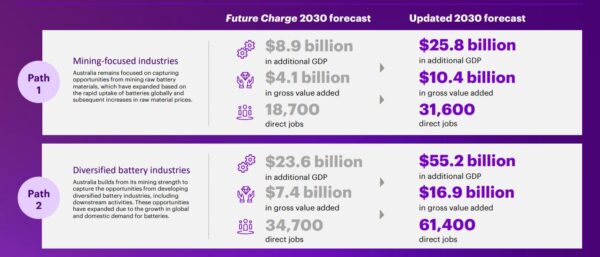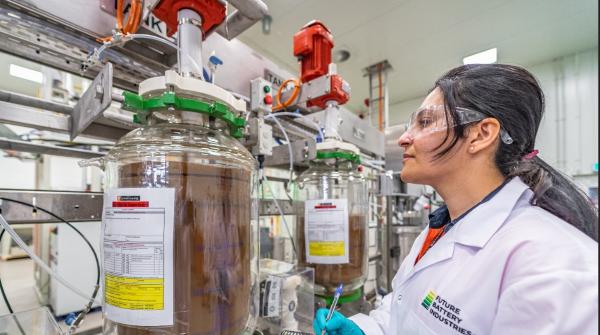The Future Battery Industries Cooperative Research Centre (FBICRC) has more than doubled its previous forecast for the value of a diversified battery industry to the Australian economy, predicting the industry has the potential to be worth nearly $17 billion and create more than 61,000 jobs by 2030.
The Charging Ahead – Australia’s Battery Powered Future study, produced by professional services company Accenture, estimates that growth in demand for batteries has increased by 64% in the past two years and will continue to accelerate to the end of the decade.
The study says increased adoption of electric vehicles (EV) is the “key driver” behind the growth with demand for stationary energy storage and a global acceleration in the energy transition also contributing to the surge.
Based on the new forecasts, the study estimates that pursuing a diversified battery industry, which includes downstream processing and manufacturing activities, would create $55.2 billion in additional gross domestic product (GDP), generating $16.9 billion in gross value added (GVA) to the economy by 2030 and supporting 61,400 jobs.
If Australia remains focused on capturing opportunities from mining raw battery materials the report forecasts that $10.4 billion in GVA will be added by 2030 and $25.8 billion in additional GDP will be generated.

2030, more than double previous forecasts
Image: FBICRC
The study says that given the country’s mineral wealth, the opportunity for Australia to grow its role in the battery supply chain is large but warned it is facing intensified global competition as other nations have also woken up to the prospect.
“Given the accelerated pace with which battery industries are developing and consolidating, Australian governments will need to act quickly to support battery industries to capture shares in high-value market segments,” the study says.
The Charging Ahead study recommends six strategic priorities to support battery industry development, including alliances, attracting large anchor tenants to Australia, coordination through government strategies and other policies, regional export partnership with neighbouring countries, and increased collaboration between industry and academia.
FBICRC Chief Executive Officer Shannon O’Rourke said the acceleration of global investment in battery industries means Australia’s window of opportunity to compete is narrowing and “the time to act is now.”
“In light of recent geopolitical developments, our report has shown Australian policymakers should explore more aggressive industry policies, target markets that are looking to diversify their supply chains, and partner with geopolitical allies to enable and enhance the potential growth of Australia’s battery industry,” he said.
The study says Australia must leverage its advantages of critical mineral wealth, reliability and security as an export partner and its environment, social and governance (ESG) credentials to capture the opportunity across the value chain.
Federal Industry Minister Ed Husic acknowledged the need for swift action, saying Australian firms will need to work quickly to ensure a window of opportunity did not “close on us”.
Speaking at the National Press Club this week Husic said Australia was in a unique position to take a leading role in the battery industry and needed to take an ambitious approach and avoid “loser talk” that had previously seen Australian innovations made overseas.
“There’s a window of opportunity to become a key player in battery manufacturing and the battery value chain, and then export that on to the world stage,” he said.
“We can’t let that window close on us. We are recognised as possessing some of the greatest stores of critical minerals and rare earths on the planet, and that’s why I’ve said if we mine it here, we should make it here. And we have the know-how and attitude to do so.”
This content is protected by copyright and may not be reused. If you want to cooperate with us and would like to reuse some of our content, please contact: editors@pv-magazine.com.









By submitting this form you agree to pv magazine using your data for the purposes of publishing your comment.
Your personal data will only be disclosed or otherwise transmitted to third parties for the purposes of spam filtering or if this is necessary for technical maintenance of the website. Any other transfer to third parties will not take place unless this is justified on the basis of applicable data protection regulations or if pv magazine is legally obliged to do so.
You may revoke this consent at any time with effect for the future, in which case your personal data will be deleted immediately. Otherwise, your data will be deleted if pv magazine has processed your request or the purpose of data storage is fulfilled.
Further information on data privacy can be found in our Data Protection Policy.